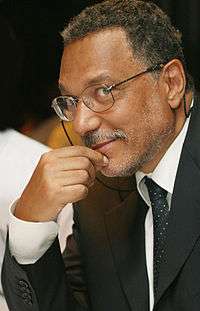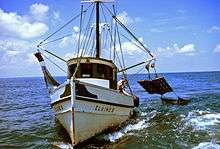Daniel Pauly
| Daniel Pauly | |
|---|---|
|
Daniel Pauly | |
| Born |
May 2, 1946 Paris, France |
| Residence | Canada |
| Nationality | France |
| Fields | Marine biologist, fisheries scientist |
| Institutions |
UBC Fisheries Centre University of British Columbia |
| Alma mater | University of Kiel |
| Doctoral advisor | Gotthilf Hempel |
| Known for |
Shifting baselines Fishing down marine food webs FishBase Sea Around Us Project Ecopath with Ecosim |
| Notable awards |
International Cosmos Prize (2005) Volvo Environment Prize (2006) Ramon Margalef Prize in Ecology (2008) |
Daniel Pauly is a French-born marine biologist, well known for his work in studying human impacts on global fisheries. He is a professor and the project leader of the Sea Around Us Project at the UBC Fisheries Centre at the University of British Columbia. He also served as Director of the UBC Fisheries Centre from November 2003 to October 2008.
Biography
Pauly was born in Paris, France. He grew up, however, in Switzerland in what was called a strange "Dickensian" childhood where he was forced to stay as a live-in servant to a new family. For the first 16 years of his life, Pauly lived an inward life as he was mixed race in an all white town, finding solace in books/reading and model construction. At 16 he ran away and put himself through high school in Wuppertal, Germany after one year working with disabled people for a local church-run institution. His work led to a scholarship to the University of Kiel.
It was at the University of Kiel where Pauly decided on fisheries biology. He said he wanted to work in the tropics because he felt that he would "fit in" better there. He also wanted to devote his life to an applied job where he could help people.
He did a master's degree at Kiel University under Gotthilf Hempel on "The ecology and fishery of a small West African lagoon".[1] Pauly then spent two years conducting trawling surveys as a member of a German-Indonesian project aiming at introducing this relatively new gear.[2] He began to write on tropical fisheries management; later his emphasis switched to global fisheries trends and conservation.
Arguably, some of Pauly's best work appeared in his Ph.D. dissertation at Kiel University in Germany, again under Hempel, in which he established strong relationships between the surface area of gills and the growth of fishes and aquatic (gill-breathing) invertebrates.[3]

After his Ph.D., Pauly worked for 15 years at the International Center for Living and Aquatic Resources Management (ICLARM), in Manila, Philippines. Early in his career at ICLARM, Pauly worked in the tropics and developed new methods for estimating fish populations. Pauly helped to design, implement, and perfect methods using length-frequency data instead of the age of fish to estimate parameters of fisheries statistics such as growth and mortality.
Later, he helped develop two major projects: ELEFAN and FishBase. ELEFAN (ELectronic Length Frequency ANalysis) made it possible to use length-frequency data to estimate the growth and mortality of fishes. FishBase is an online encyclopedia of fish and fisheries information comprising information on more than 30,000 different species. Both projects received worldwide attention and through multiple upgrades and additions, are still prominent in fisheries biology.
Through the 1990s, Pauly’s work centered on the effects of overfishing. The author of several books and more than 500 scientific papers, Pauly is a prolific writer and communicator. He developed the concept of shifting baselines in 1995 and authored the seminal paper, Fishing down marine food webs, in 1998.[4] For working to protect the environment, he earned a place in the "Scientific American 50" in 2003, the same year the New York Times labeled him an “iconoclast”. Pauly won the International Cosmos Prize in 2005, the Volvo Environment Prize in 2006, the Excellence in Ecology Prize and Ted Danson Ocean Hero Award in 2007, the Ramon Margalef Prize in Ecology and Environmental Sciences in 2008, and the Nierenberg Prize for Science in the Public Interest from the Scripps Institution of Oceanography in 2012. In 2015, Pauly received the Peter Benchley Ocean Award for Excellence in Science.
Pauly has written several books, including Darwin's Fishes (Cambridge University Press), Five Easy Pieces: How Fishing Impacts Marine Ecosystems (Island Press) and Gasping Fish and Panting Squids: Oxygen, Temperature and the Growth of Water-Breathing Animals.
Views
To date, he frequently expresses opinions about public policy. Specifically, he argues that governments should abolish subsidies to fishing fleets[5] and establish marine reserves. He is a member of the Board of Oceana. In a 2009 article written for The New Republic, Pauly compares today's fisheries to a global Ponzi scheme.[6]
Publications
Select publications
- Pauly D (2010) 5 easy pieces: how fishing impacts marine ecosystems Island Press. ISBN 978-1-59726-719-9.
- Pauly D (2009) "Aquacalypse Now" The New Republic, September 28.
- Pauly D, Christensen V, Guénette S, Pitcher TJ, Sumaila UR, Walters CJ, Watson R, Zeller D (2002) "Towards sustainability in world fisheries" Nature, 418: 689-695.
- Pauly D (1998) "Why squids, though not fish, may be better understood by pretending they are". In: Payne, A.I.L., Lipinkski, M.R., Clarke, M.R. and Roeleveld, M.A.C. (eds.). Cephalopod biodiversity, Ecology and Evolution. South African Journal of Marine Science, 20: 47-58.
- Pauly D, Christensen V, Dalsgaard J, Froese R and Torres F (1998) "Fishing down marine food webs" Science, 279: 860-863.
- Pauly D (1998) "Beyond our original horizons: the tropicalization of Beverton and Holt". Reviews in Fish Biology and Fisheries, 8(3): 307-334.
- Pauly D (1995) "Anecdotes and the shifting baseline syndrome of fisheries". TREE 10(10): 430
- Pauly D and Christensen V (1995) "Primary production required to sustain global fisheries" Nature, 374(6519): 255-257.
- Pauly D (1981) "The relationships between gill surface area and growth performance in fish: a generalization of von Bertalanffy’s theory of growth". Berichte der Deutschen Wissenchaftlichen Kommission für Meeresforschung, 28(4): 251-282.
- Pauly D (1981) "On the interrelationships between natural mortality, growth parameters and mean environmental temperature in 175 fish stocks". Journal du Conseil international pour l'Exploration de la Mert, 39(3): 175-192.
- Pauly D and David N (1981) "ELEFAN I, a BASIC, program for the objective extraction of growth parameters from length-frequency data". Reports on Marine Research, pp. 205–211.
Notes
- ↑ Pauly, D. 1973. Investigation on the ecology and fishery of a small West African Lagoon. M.Sc. Thesis. In German with an English summary
- ↑ Malakoff 2002
- ↑ Pauly, D (1998) Why squids, though not fish, may be better understood by pretending they are In: Payne AIL, Lipinkski MR, Clarke MR and Roeleveld MAC (eds). Cephalopod biodiversity, Ecology and Evolution. South African Journal of marine Science 20: 47-58
- ↑ Pauly D, V Christensen, J Dalsgaard, R Froese, and F Torres Jr. (1998) Fishing down marine food webs Science 279: 860-863.
- ↑ AAAS (2007) The last wild hunt – Deep-sea fisheries scrape bottom of the sea
- ↑ Aquacalypse Now, The New Republic, September 28, 2009
References
- Dr. Daniel Pauly biography on the UBC Fisheries Centre website
- Scientific American, December 2003, p. 59
- Malakoff D (2002) "Daniel Pauly profile: Going to the Edge to Protect the Sea" Science, 296 (5567): 458–461.
- Powell, G. 2002. Lifelines: Daniel Pauly. Nature 421: 22-23
- Yoon, C.K. 2003. Iconoclast looks for fish and finds disaster The New York Times 1/21/2003
External links
- The Fisheries Center at UBC
- FishBase
- New York Times Profile
- Interview on Fresh Air - Nov 2, 2009
- Fisherman Life (2008) An interview with Daniel Pauly by Margaret Boyes
- Ocean fisheries – gloom and doom
- The granddad of fisheries science audio
- Daniel Pauly
- Daniel Pauly New Scientist.
- Laudatio for Professor Daniel Pauly
- Video : interview with Daniel Pauly (April, 2009)
- Daniel Pauly's Keynote Lecture at the International Marine Conservation Congress in May 2009 on YouTube
- Video: Daniel Pauly explains fishing down marine food webs, from 2015 web-film Troubled Waters on YouTube
- Daniel Pauly: Fishing for a Perfect Ocean Scientific American, 11 May 2009.
- The ocean's shifting baseline Pauly's April 2010 TED Talk regarding Mission Blue

